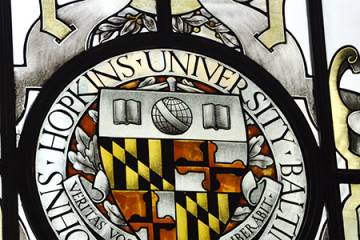Johns Hopkins University today responded to concerns raised recently about the university's contractual relationships with the U.S. Department of Homeland Security's Immigration and Customs Enforcement agency, or ICE, saying that though issues identified by members of the university community are "serious and deserve a considered response," the university does not intend to end agreements that provide education and training to the agency.
ICE has come under criticism of late for its role in carrying out controversial federal immigration policies, particularly directives related to family separation and deportation. A petition urging the university to disassociate itself from the agency and signed by nearly 2,000 individuals—the majority of them Johns Hopkins students, faculty, staff, and alumni—was delivered to the president's office in Garland Hall on Sept. 21.
In a detailed response to that petition, JHU President Ronald J. Daniels and Provost Sunil Kumar thanked the petitioners for their "efforts to engage our community in debate around significant national policy issues and the work and role of our university." They then explained their conclusion that it would be "wrong to insist that these contracts be terminated.
"Our reasoning is grounded in the university's longstanding deference to faculty decisions made in relation to their research, teaching, and clinical work," Daniels and Kumar wrote. "This stance is an aspect of our more generalized commitment to the principle of academic freedom. … We believe that it would be antithetical to the mission of the university if we were to insist that faculty members withhold instruction or medical care in order to have the university express its disapproval with certain aspects of current federal policy."
Daniels and Kumar also reaffirmed the university's "unwavering commitment to supporting our international and DACA students; offering broad access and support to our students, faculty, and staff without regard to immigration status, and providing exceptional care to immigrant and refugee populations in our hospitals and clinics in the United States and around the world.
"We have been unequivocal," they added, "in our public statements concerning the consequences of recent immigration policies that have a clear, direct, and demonstrable impact on members of our university community."
At issue are two longstanding educational programs at Hopkins:
- The School of Education's Division of Public Safety Leadership, which has taught leadership and management courses in degree and certificate programs to law enforcement and public safety personnel at the local, state, and federal levels since 1994, including under a contract with ICE since 2008. This contract will expire in 2019, and the PSL program as a whole is currently being wound down.
- The School of Medicine's Center for Law Enforcement Medicine, which provides specialized physician oversight and education for federal law enforcement personnel who are cross-trained as paramedics and emergency medical technicians, including under contracts with the U.S. Secret Service (since 1999), the Bureau of Alcohol, Tobacco, Firearms and Explosives (since 2007), the U.S. Marshals Service (since 2007), and ICE (since 2004).
A petition urging the university to end the contracts these programs have with ICE was created in July by Drew Daniel, an associate professor and director of graduate studies in the university's Department of English.
The petition, addressed to President Daniels, reads, in part: "Given the extent and extremity of its cruel practices and the scale of ongoing human rights charters which ICE continues to violate, we do not see how in good conscience Johns Hopkins University can collaborate with this organization. Accordingly, we urge you to sever the ties that currently connect our two institutions together."
"I care very deeply about Johns Hopkins," Daniel said, "and to me Hopkins stands for a compassionate, intellectual mission, not for assisting people overseeing the imprisonment of children."
In response to the petition, university officials weighed the concerns it articulated and also spoke with faculty members who oversee the two programs. Daniels and Kumar note that many of those faculty members share the concerns raised by the petition and yet do not see their work as an endorsement of current immigration policies.
"Our colleagues believe that their programs serve the public interest by providing quality education and emergency medical training that ultimately benefits those who interact with the agency," Daniels and Kumar wrote. "Their conviction is buttressed by the fact that the two programs appear to function at some distance from the policies and operational decisions of the federal government, decisions which necessarily change over time and across administrations."
Posted in University News
Tagged immigration









